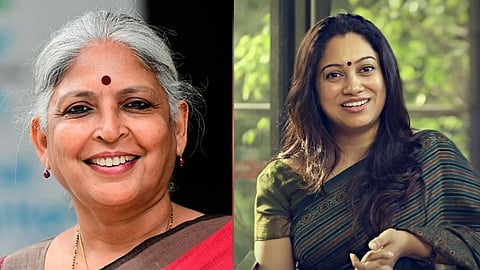

Five years have passed since the Justice Hema Committee, formed by the Kerala government to study the problems faced by women in the Malayalam film industry, submitted its inquiry report. After a prolonged fight by RTI activists and journalists, the report, which was finally scheduled to be issued to applicants at around 4 pm on July 24, was stayed on the same day by the Kerala High Court. The one-week stay was granted in a writ petition by producer Sajimon Parayil who approached the court alleging that the report’s disclosure would violate the privacy of several persons in the industry. TNM spoke to a few members of the Women in Cinema Collective (WCC)--the organisation which was instrumental in getting the government to form the Committee – to understand what the way ahead looks like for them.
Filmmaker and WCC core member Anjali Menon said that she is not at all surprised by the stay, since resistance has been a regular pattern in the film industry. “If the industry wants to make any changes, they don’t have to wait for the Hema Committee report. WCC has presented the industry and the government with a report with recommendations on gender issues (in partnership with Sakhi Women Resource and held conferences, conclaves, discussions, etc with industry members in all South Indian Film Industries). Ormax has brought out the O Womaniya report. If there is an intention, it can be set right as soon as we know something is wrong. But here the pattern seems to be that if somebody calls out a wrong practice, they are treated like the troublemakers - the entire onus of proving it 101% is on the whistleblowers, while the rest prefer to ignore and sail along pretending that all is well,” she told TNM.
Anjali further added that this is because of a resistance to change, as faced by all social movements. “What is very fortunate is that the change has started already in the larger society and is no longer reliant on the contents of a hidden report. Courtesy the blatant powerplay and the consistent voices of protest, people have become a lot more aware over the last few years. There is an open audience, society out there today that can clearly see the unequal dynamics going on. The whole exercise has exposed the way things work. As a result, women coming into the industry today are far more aware and outspoken, which helps the cause of equality in our workplace," she said.
The Hema Committee was formed in 2017, in the aftermath of a brutal sexual assault of a woman actor in Kochi, allegedly masterminded by actor Dileep. WCC had met with Chief Minister Pinarayi Vijayan and sought a comprehensive study of the film industry. This led to the formation of the Committee under the leadership of retired judge K Hema, and the Committee submitted its report in December 2019. The report, which also includes recommendations to make the cinema industry a safer workplace for women, has remained unpublished to date. Earlier this month, the State Information Commission (SIC) had passed an order to issue a redacted version of the report to RTI applicants by June 25, after removing identifying details of individuals.
Stating that the report is not only for the welfare of women, Anjali also pointed out that by exposing disparities, the workplace can improve for everybody. “The report was expected to throw light on the unwieldy power corruption. And studies like these, if done properly, can subvert that to bring positive change. The focus should be on the unhealthy practices of the industry and what can be done to close the gaps and bring zero tolerance to gender discrimination. But there seems to be a paranoia about the report’s contents. Why so much fear? Why object to it when no one supposedly knows what is in it? ” she asked. "WCC will continue to follow up on the Hema Committee report to bring accountability and closure to something we asked for,” she said.
Sajimon Parayil claimed before the court in his writ that the report would affect his right to privacy and that he might become a scapegoat if his name was mentioned in it. He also argued that the disclosure of the report would “breach” confidentiality promised to the witnesses who deposed before the Committee, and violate their fundamental right to privacy.
Veteran film editor and WCC member Bina Paul said that WCC is keen to see the report not because of the interest in the names involved. “We just want to know what the findings are on the basis of what the Committee studied, and see whether the government will act on those recommendations,” Bina Paul told TNM.
Regarding the concerns of privacy raised before the court, she said that the names of the women and their experiences are already instructed to be redacted by the SIC. “There are no names in the report. Both the government and the SIC have given assurances that there are no names. Right now, attention is being drawn towards unnecessary things such as who is named and not, instead of addressing the issues in the industry,” she said, adding that they hope the report will be released in a week.